|
|
|
Sort Order |
|
|
|
Items / Page
|
|
|
|
|
|
|
| Srl | Item |
| 1 |
ID:
148719
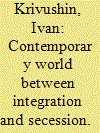

|
|
|
|
|
| Summary/Abstract |
The article discusses two major trends in contemporary world politics—the disintegration of the nation-state and supranational integration—and analyses their nature, causes and significance. The author concludes that these processes have a different character within and outside Europe and that the multidirectional trends in different parts of the world, on the one hand, complicate Russia’s foreign policy-making and implementation, but, on the other, widen Russia’s room for diplomatic manoeuvring and increase the opportunities to exploit the contradictions between old and new actors in international relations.
|
|
|
|
|
|
|
|
|
|
|
|
|
|
|
|
| 2 |
ID:
148726
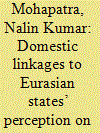

|
|
|
|
|
| Summary/Abstract |
Eurasia’s preponderance in global politics is gaining because of its location, resources, as well as mosaic population having diverse ethnic backgrounds. Since the invasion by the Mongolians in the 13th century, Eurasia as a geopolitical unity, attempted by Chengiz Khan, has been the foundation for Russia’s policies towards this region
|
|
|
|
|
|
|
|
|
|
|
|
|
|
|
|
| 3 |
ID:
148713
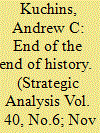

|
|
|
|
|
| Summary/Abstract |
On December 25 of this year we will mark 25 years since the collapse of the Soviet Union. Many in Russia and the West were optimistic about the seeming imminent integration of Russia into a Western-led liberal democratic global order. The United States, in particular, fresh off its ‘victory’ in the Cold War, could hardly restrain its triumphalism as it stood astride the world as the sole superpower. As the 1990s came to a close, US power and dominance seemed only further augmented as the dot.com boom fuelled economic and technological growth of historic proportions while Russia had endured a decade of massive economic dislocation. Leading US international relations scholars crowed about the ‘durability of a unipolar order’ in 2000 precisely at the moment when the worm began to turn as the boom turned to bust and the United States embarked on a foolish and unnecessary war in Iraq that has cost the country mightily in blood, treasure, and international credibility and reputation.
|
|
|
|
|
|
|
|
|
|
|
|
|
|
|
|
| 4 |
ID:
148718
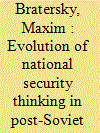

|
|
|
|
|
| Summary/Abstract |
This article contributes to the rich body of literature on Russian security perceptions and analyses how Russian security thinking evolved over the last 20 years. The focus of the article is on how Russian security perspective shifted from the goal of assuring Russian security by integration and cooperation with the West to the idea of Russia’s own separate geo-economic project and the goal of reducing the country’s dependencies on the West. Security in this article is understood both as a military-political and as an economic phenomenon.
|
|
|
|
|
|
|
|
|
|
|
|
|
|
|
|
| 5 |
ID:
148715


|
|
|
|
|
| Summary/Abstract |
Twenty-five years have passed since the Cold War, but no stable international order has been created. The idea about a Western-centric unipolar world has failed, and a multipolar system is yet to emerge, though it’s hard to comment on how it may function properly.
|
|
|
|
|
|
|
|
|
|
|
|
|
|
|
|
| 6 |
ID:
148716


|
|
|
|
|
| Summary/Abstract |
This article examines the difficult search for identity in modern Russia amid debate over its future development. It explores practices in such countries as China and Germany, which have successfully adapted national identity to the need for modernisation and effective development in a new historical environment. The article analyses the risks that stem from Russia’s inclination towards focusing on the past and absolutising the factor of space. Finally, the piece offers suggestions on how to forge Russia’s new identity.
|
|
|
|
|
|
|
|
|
|
|
|
|
|
|
|
| 7 |
ID:
148714
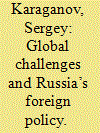

|
|
|
|
|
| Summary/Abstract |
The article discusses the results of Russian foreign policy since the collapse of the Soviet Union against the background of major new global and regional international trends and the policy of other major world powers. The author argues that Russia should work for preventing a new structured confrontation in Europe, maintaining international stability, and keeping the world from sliding into a big war which seems to be more likely now than ever before in the last 50 years. At the same time it should join forces with China, India, Iran and other major non-Western players in building a community of cooperation, development and security for Greater Eurasia, open to the world and serving as one of the pillars of its stable and peaceful development. The world is changing incredibly fast and precariously. Russia must occupy a leading place in this world by moving towards economic growth and playing a key role in preventing a new world war, supporting global strategic stability and building or rebuilding international cooperation and security structures for the decade to come.
|
|
|
|
|
|
|
|
|
|
|
|
|
|
|
|
| 8 |
ID:
148724
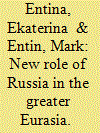

|
|
|
|
|
| Summary/Abstract |
Key ideas associated with Eurasianism were developed in the 19th century. The narrative of classical Eurasianism in the 1920s was developed to explain that Western civilisation was not superior to other civilisations. Eurasia is the middle continent between other parts of Europe and Asia. There are historical, geographical, and cultural impetuses here which push nations to different forms of association. However, the dissolution of the USSR gave birth to new ideologies and political theories of Eurasianism. The most positive one was extensively developed by the President of Kazakhstan Nursultan Nazarbaev. Today, we witness the fourth stage of the development of Eurasianism.
|
|
|
|
|
|
|
|
|
|
|
|
|
|
|
|
| 9 |
ID:
148722


|
|
|
|
|
| Summary/Abstract |
The current crisis and pause in development of the EU–Russia relations provide a unique chance to shed the burden of past problems and start new relations from scratch. Both sides should sort out their values and get rid of the ballast generated by the bureaucratic inertia or false understandings of partnership. Russia and Europe are unlikely to evolve a common vision for the future. Their future is not in unity but in co-existing next to each other. It is time that Russia and the EU clearly formulate their real interests and try to make relations predictable. To achieve this, however, both sides need to answer some basic questions.
|
|
|
|
|
|
|
|
|
|
|
|
|
|
|
|
| 10 |
ID:
148717


|
|
|
|
|
| Summary/Abstract |
The socio-economic history of Russia demonstrates that its ‘place’ in global economic relations has been subject to complex cyclical processes. The country entered the 20th century with a high growth rate and burgeoning industrialisation that included significant foreign capital. Historically exports primarily included raw materials such as grain and timber while imports consisted largely of machinery and consumer goods. The fast industrialisation and society changes involved large numbers of people in manufacturing, finally bringing success in many areas, especially education, nuclear and space studies, weaponry and health care. However, during the 20th century the general trend toward modernisation was interrupted by World War I, the Civil War, purges of the 1930s and World War II, which caused enormous loss to both the working population as a whole and, in particular, to its most creative members: the entrepreneurs and the intelligentsia. The collapse of the Soviet Union caused a further loss of industrial potential, a surge in emigration and the need to restructure socioeconomic institutions and launch a new wave of modernisation. At each such critical juncture, the country relied heavily on export of raw materials, struggled to restore human capital and defence capabilities, and was forced to import technologies and consumer goods, now and again as a century ago, while each time on a different level.
|
|
|
|
|
|
|
|
|
|
|
|
|
|
|
|
| 11 |
ID:
148720
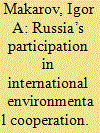

|
|
|
|
|
| Summary/Abstract |
While environmental issues attract growing interest all over the world Russia has kept aside from this trend for a long time. Its participation in international environmental cooperation has always been determined primarily by the external policy’s objectives. In Soviet times, participation in global environmental initiatives was a channel of collaboration with the West. In the 1990s, it was a means of integration into the international community and one of the major areas of cooperation with the US. In the 2000s, Russia used the environmental agenda for gaining trade-offs from Western partners along with attraction of foreign investment. At present, the understanding of possibilities to reap benefits from the country’s natural capital is strengthening among Russian political and business elites. As a result, Russia’s involvement in international environmental cooperation may stir up in the near future.
|
|
|
|
|
|
|
|
|
|
|
|
|
|
|
|
| 12 |
ID:
148723
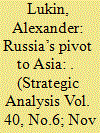

|
|
|
|
|
| Summary/Abstract |
The article discusses the changes in Russia’s policy towards Asia, arguing that Russia’s pivot to Asia is a reality, one that is motivated by both political and economic interests. And although that shift is not progressing as quickly as some might want and occasionally encounters difficulties, the process has definitely begun and is in all likelihood irreversible. Only a small, marginal segment of Russian society continues to dream of unity with Europe—which itself has entered a period of severe crisis. Most of the Russian elite as well as the majority of Russian citizens understand that nobody is waiting for them with open arms. Therefore, not wanting a confrontation and in an effort to maintain working relations, Russia—under any leader—is unlikely to seek a relationship based on a common outlook. That will move Russia ever closer to the non-Western world, primarily the Asian giants.
|
|
|
|
|
|
|
|
|
|
|
|
|
|
|
|
| 13 |
ID:
148725
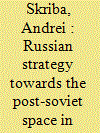

|
|
|
|
|
| Summary/Abstract |
After the Ukrainian crisis and Russia’s actions in Crimea and Donbass, there is a growing lack of understanding about Russian interests in the post-Soviet space. Russian authorities have been accused of having a desire to expand its territory, trying to re-Sovietise the region, and using neo-imperial approaches of doing business with its neighbours. However, the genesis of Russian strategy towards post-Soviet space is much more complicated. It is based on the country’s long-term interests, such as economic cooperation, security, regional stability, cultural contacts, and preservation of historical influence. Studying these interests and their contribution to the foreign policy helps us better understand Russia’s strategy in the European post-Soviet countries.
|
|
|
|
|
|
|
|
|
|
|
|
|
|
|
|
|
|
|
|
|